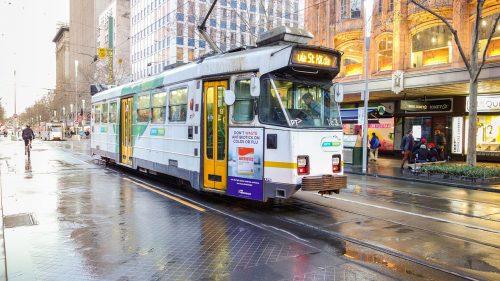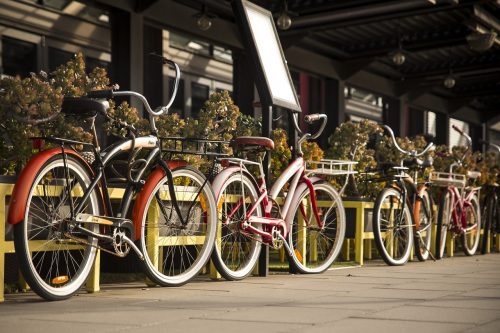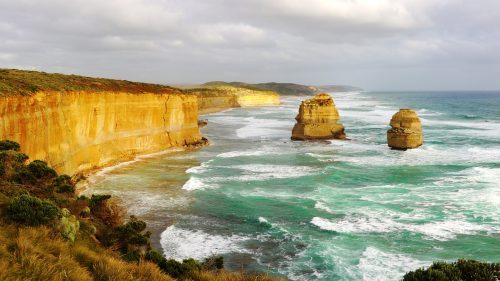How to shift human behavior is a central question for anyone committed to a post-carbon future, including LAGI2018 Melbourne juror Stan Krpan.
CEO of Sustainability Victoria (SV), a statutory authority established under the Sustainability Victoria Act 2005 to “facilitate and promote environmental sustainability in the use of [state] resources,” Krpan has led a highly effective agency that has generated $248.4 million in total present value benefits to Victoria from an investment of $28.6 million, according to an independent impact assessment recently conducted by ACIL Allen.

Having worked with individuals, communities, businesses, and schools to help them better conserve natural resources and manage waste, he has a unique perspective on what it takes to make change. And he says staying positive is critical.
Krpan says SV is working with BehaviourWorks Australia, a research organization that claims to help government departments, nonprofit organizations, and the private sector better understand how to influence behavior that is “most likely to succeed in tackling social, environmental and organisational problems”. Different strategies are required for different cohorts, notes Krpan, such as individuals or families, and around subject matter — whether it’s recycling, energy efficiency, or renewables.
To better inform their programs and government policy, SV hired Wallis Market and Social Research (Wallis) to conduct a state wide survey to specifically understand Victorian residents’ views about climate change. Krpan says they were looking for baseline data that would demonstrate what people think about climate change, their interests and concerns, and what barriers exist to facilitating change.

“What we were surprised by was the level of commitment and understanding around climate change,” he says. “We were dealing with an audience that was quite engaged, and was really looking for additional inspiration or support to make a transition.”
A telephonic and followup online survey of 3,333 residents throughout Victoria posed questions developed with input from climate change psychologists, behavior change academics, and other experts. Professor Joseph Reser, an environmental and social psychologist at the School of Applied Psychology at the Griffith Climate Change Response Program reviewed the questions, which touched on topics such as general knowledge of climate and sustainability issues, awareness of and support for government initiatives, and who is responsible for taking action. The results are promising.
91 percent of Victorian residents accept some level of human causality for climate change, 78 percent believe that the issue requires urgent attention, and 73 percent prefer to give their money to businesses that demonstrate concern for or awareness of climate change. The government sees this latter point as an excellent opportunity for businesses in the State to improve their climate-change-busting game. There’s more — and this is especially encouraging for anyone who is frustrated by the pace at which change is currently occurring.

Four in five Victorians not only believe that their actions can make a difference, but are willing to get their own hands dirty. Nine in ten people believe that the State government should be taking action to address climate change, and eight in ten want to live in a state where said action is being taken. While it’s impossible to trace exactly who and what planted the seed of these attitudes, the ACIL Allen assessment cites several programs that have had a particularly meaningful impact.
A couple of the report’s key findings connect SV’s work with the attitudes among Victorians. For example, the report found “SV has changed social behaviours and cultural attitudes toward waste and energy across a range of programs,” and that “SV’s strong focus on collaboration and consultation is improving industry and community engagement in environmental issues across Victoria.” ACIL Allen also found that “SV is an innovator and leader on environmental matters in Victoria as well as other jurisdictions, particularly around co-regulatory approaches.”
Furthermore, according to the report, SV could expand its leadership role and impact by “bringing stakeholders together, co-designing projects to achieve agreed outcomes, establishing common data or knowledge systems, [and] agreeing on how they will measure and reward performance.”

Speaking over the phone, Krpan expresses a sense of urgency to keep mobilizing towards Victoria’s goal to reach net-zero carbon emissions by 2050 (a goal he says is shared by five other states). Yet, while discussing one of the principles underlining SV’s legal mandate — “the need to consider the global dimension of environmental impacts of actions and policies” — he is remarkably forgiving about humanity’s inability to get there so far.
“You can’t wait for global action,” he says. So SV took the “pragmatic and non-judgmental view” that no matter how small the action, if it was a positive action for the environment, in the context of the principle that local actions have global ramifications, they would encourage it. And despite the slow pace of change so far, Krpan is optimistic. “Every day I see new inventions, new technologies, new evidence that the community is looking for that transition.”
As for the Land Art Generator Initiative, he says he was delighted to be on the jury for this year’s design competition in Melbourne. “It’s actually about inspiration and hope,” he says. “What we’re building, at least in relationship to renewable energy and decarbonization, will be a better world.”
All images via Pixabay
Tafline Laylin is a freelance communicator and journalist who strives for global environmental and social justice. Her work has appeared in The Guardian, The Atlantic, OZY.com, and a variety of other international publications.

